Charger The battery of my iphone was down The red circle indicated mostly out of commission. Only thirteen percent left The circle was whitening, slowly closing in I was in my car driving a long distance out Precisely, I put my car charger on my iphone. I heard the iphone sounding beep, beep, beep. It rhymed a pulse of my own heart beat under the skin. Every bit of my heart pumped out a rhythmic wavelength The body battery was also low at some point, my take. It had to be plugged into a socket somehow A socket of lifeline fed the blood life. Without the collection of ion The iron of the blood would congeal otherwise. The iphone battery was up in no time While one charged on electricity, the other was plugged into the stars. Both batteries of the body and the iphone Starved when a star burnt out.
Monthly Archives: April 2023
Poetry from Stephen Jarrell Williams
"Road Walkers" Sunrise solitude trees hiding my footprints a few hours reflecting the past unfolding way back chosen few many of us had to run heavy backpacks stuffed with prophetic poems word bombs exploding the supposed peace quick copied and buried hiding in the wilderness they caught some of us sentenced to a choke of silence my old friends now in a blur their screams in the crackling leaves their flesh left against cracks in the walls pinch of prison bars inventive years the rest of us staying alive around campfires and crammed inside caves star gazers and wall painters tasting sugar honey when we slept remembering before our good deeds became unbreathable and illegal yet the world underestimating you should never cheat the Creator now reaping with endless lines toxic food in plastic bags on their knees with bent straws sipping gutter water strangers becoming stranger giving hand signs in a cryptic rage broken fingers swollen tongues somewhere books still telling the truth pages burning to keep warm wilderness closing in beside the mountains of dead finally out into the open I run looking for my lonely cross not many of us left to torture truthsayers into the sun. "Someday Flowering Lands" Some of us seen in the distance shadow stick figures disappearing in the flowing mist fog of lowering clouds passing they hear our whispers thought arrows prickling inside their heads later in the evening quiet rubbing their chins wondering why they're thinking pre-dreams of flowering lands paradise people singing to the stars angels dancing with tambourines and harps breaths from heaven everlasting no fear no hate no worries no cliff falls down to an expired world hopefully our prayers have an effect on the spoiled and mega rich. "End of the Road" She steps lighter than air upon the stones telling me on our last trip before she passes her final test wings won't be needed God lifting whenever we want I wasn't sure at the time if she was hallucinating with her fading breaths tender touch to my hand until a soft glow of light embraced her that night in a clearing of grass beside the highway between cities she was queen of the road walkers everyone had seen her on the gradual slope of plains and the paths to mountaintops her voice sweet as her spirit everyone weeping at the end of her road.
Art from Michael Barbeito
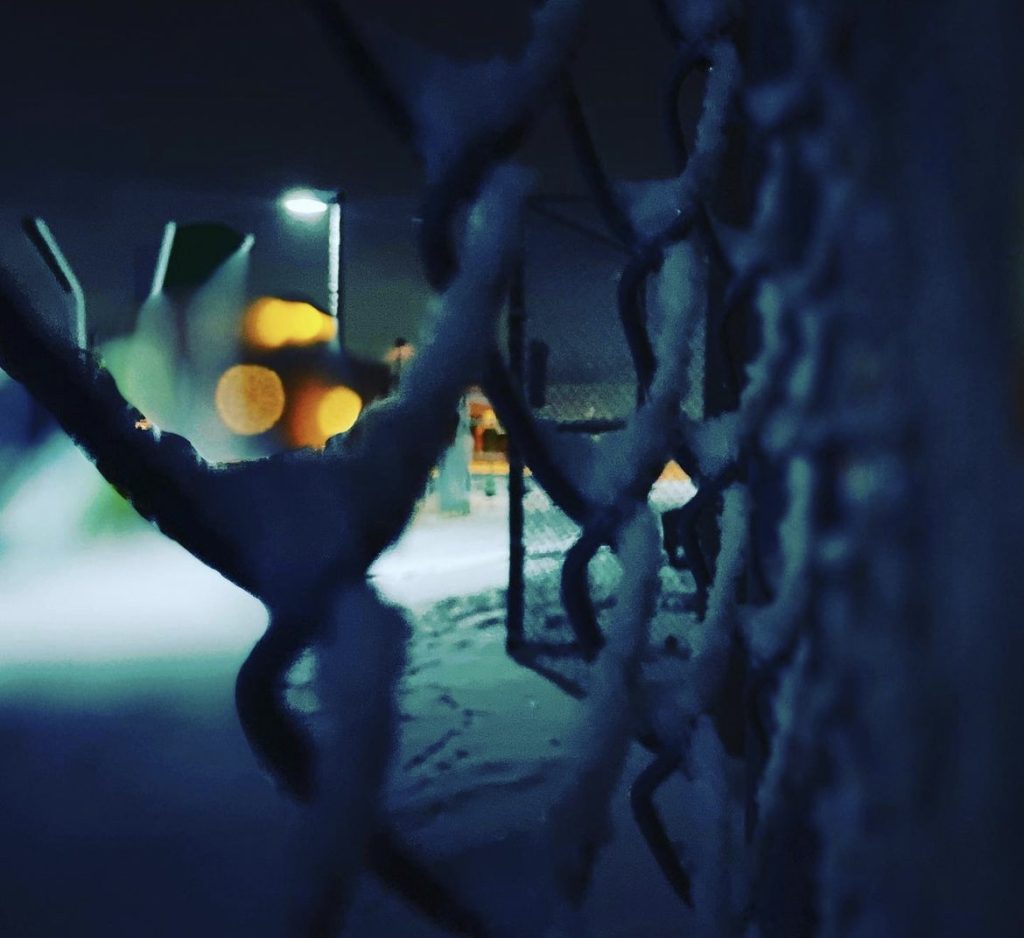
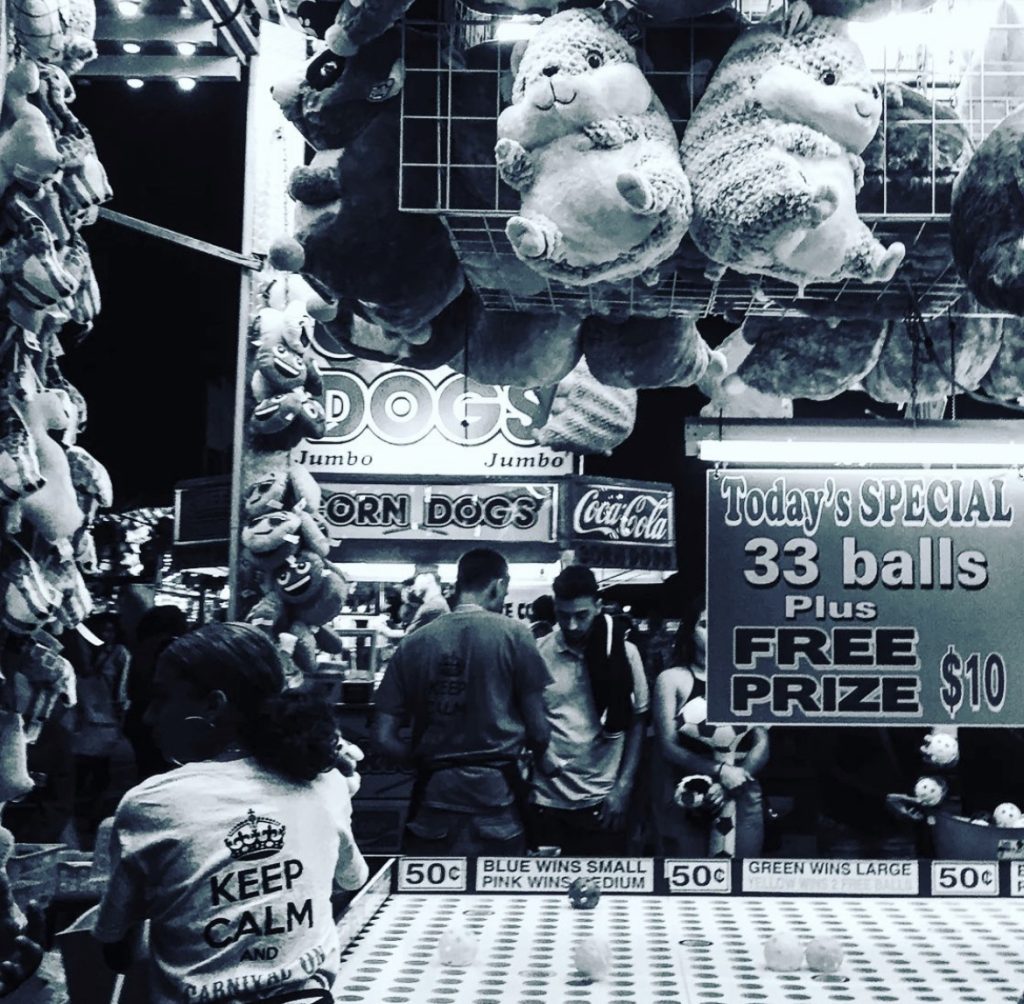
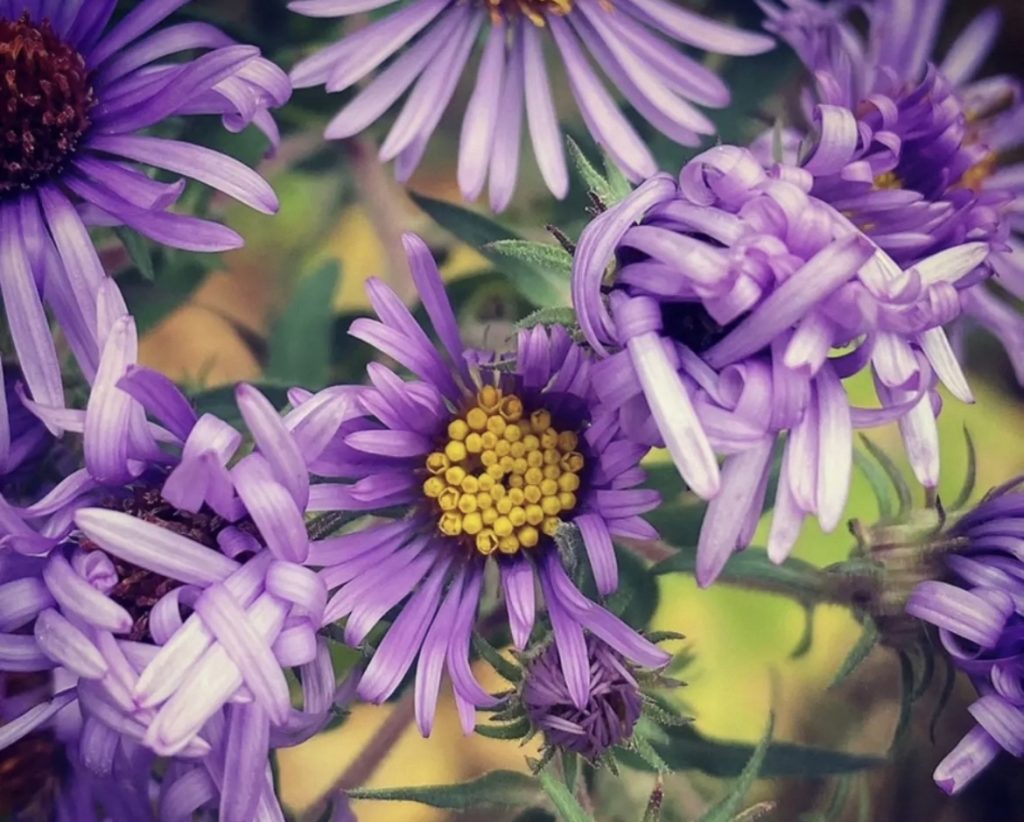
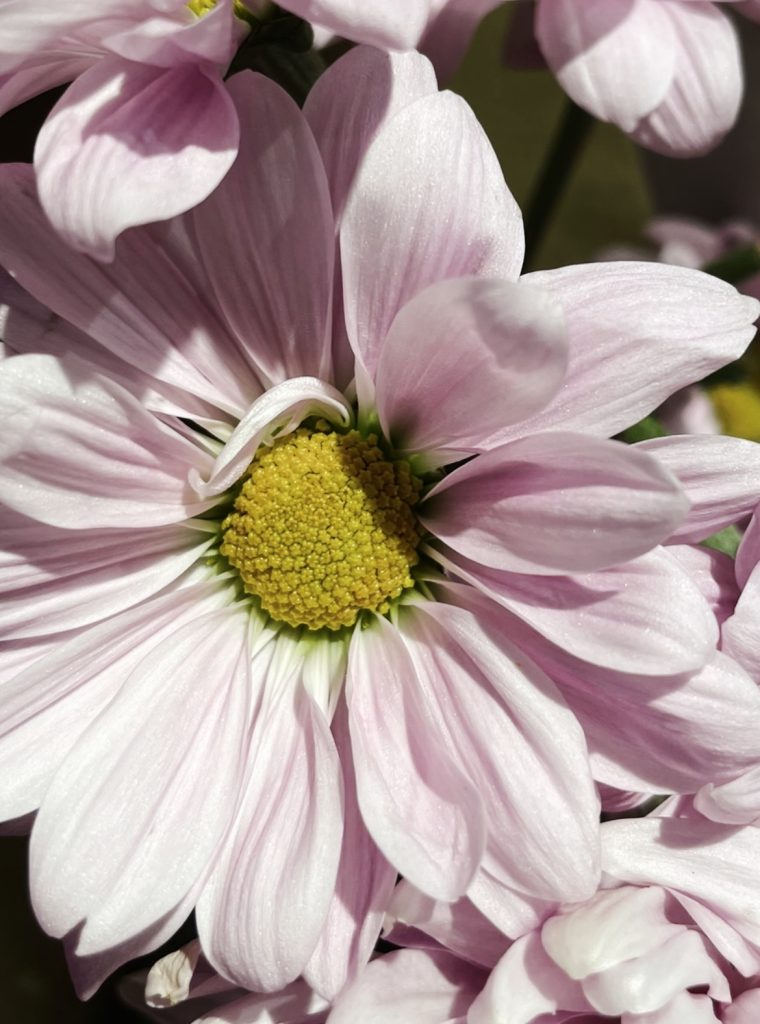
Brian Michael Barbeito is a Canadian writer and photographer. Recent work appears at The Notre Dame Review.
Spirit of a Place, Spirit of a Thing (Artist Statement)
In an off handed remark during an interview, U.G. Krishnamurti, called by some an anti-guru, and by himself, ‘Something like a philosopher,’ said that he once thought he could sense the spirit of a place. But then he brushed it off through words and body language. It didn’t fit in with his philosophy and message. But I resonated with his statement anyhow, because I had always felt that I could feel the spirit of a place and also a thing. Old town, lake still and wide. City street, carnival game vendor and prizes. Bee. Spider. Flower. Vine. Ridge. Summit. Stone. Petal. Stream. Sun. Cloud. Bird and dusk, horizon and dawn. Lock, denoting love, affixed to lonesome bridge alone in the rain. Artifacts. Areas. Some saturnine and some sanguine. Hundreds of places and things, their spirit, against reason and logic, somehow speaking out, not with language of course, but calling out nevertheless. Semantics and nomenclature could argue what spirit means. Is it the atmosphere, the daemon, the angel, the area, the vibration, the feeling? Is it physical, metaphysical, true and there, or purely imaginary and projected? Difficult to know conclusively. But there is something I think in all that mise- en-scene, and so on the rural footpaths and metropolitan worlds also, I try and photograph it and also write about it, this spirit of a place.
Song lyrics from Chimezie Ihekuna
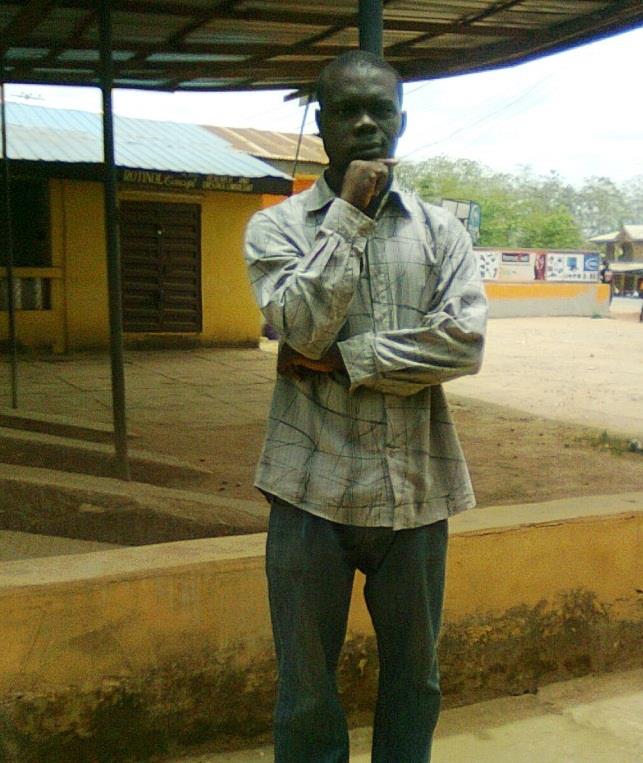
Title: Where am I headed Genre: Pop (Spoken word) Verse 1 I was lost in myself; I hardly could figure out why But when I tried asking ‘’why?’’ It became very blurry the answer Could it be what I thought I knew Or what is happening around me? I looked at the completeness of my world Only to realize how vague it has become My perception , I thought, would guide me But the contradiction, compared to what I’m encountering, is something else Am I just becoming ignorant or in a conundrum? Then, I’d say, ‘’time would tell’’ However, time, I realized, was my foe So, I have to really figure out where am I headed? Verse 2 Come to think of it, I was educated Educated?! Okay, I was taught in school what’s right from what’s wrong On second thought, recognizing the anomalies in my life and the world as a whole I’m observing that everything is so wrong that what’s left isn’t right! What I was taught was ‘’the good’’ seem to be the bad And vice-versa Can this really be? Hmmm…Trying to think through But wait, can provide an answer to what I don’t know? Well, perhaps, the wrong answer! To the issue at hand, did I learn the right thing? Can I change the situation around me? I believed in the world of possibility But my perception is fighting against what is around me! Oh yea! Something isn’t right So, It’s time I looked at the mirror and ask Where am I headed? Verse 3 Can anything worth learning ever be taught? A question I was forced to ask myself I have to re-evaluate what my thoughts are about everything A friend really challenged when she asked ‘’what if all you knew about everything and what you are being told and taught about everything were all false, what you goinna do?’’ Till this day, i have no concrete answer Yet, I’m poised to challenge myself and move in this light ‘’How?’’ I asked, looking to the heavens for answers After lengthy years of thinking and asking people questions, I came to the realization: Unlearn the inconsistent to relearn what ought to be ingrained in mindset of my formative years for a proper learning That, I knew, would help me change what I encountered ‘’Afterall, a change in my thought-process, better yet, my perception, would change my circumstances, my world, that is.’’, I thought. ‘’And make the world at large a better place’’ ‘’How do you want to go about it?’’ someone asked me, as I talked to him about my situation It’s going to be a long path to illumination Then, I would know where I am headed
Essay from Abigail George
Loneliness By Abigail George I am cooking loneliness in a pot. I am making a broth with it. I add garlic and ginger, leaf masala and meaty bones to the pot and more boiling water. I throw salt in to taste. I think of the neverending invasion of war ingredients in daily life. I think too much. I overthink. Stop. Ants tripping, crawling with life. The world is filled with people who don’t care about me or who love me. There were billions of them at last count. I am a tree and then I grow into a branch, arch my back into a stretch. Small and red is my heart now. Just a curious ribbon tied to my hair. I remember when the man climbed me, climbed into me. The bliss I felt at this feeling, this encouraging emotion filled me with hope. I climb into the boat made of wildflowers and somehow land on the moonlight. I make a cave out of the night air. I have experienced love for the last time. This is the last wound I will ever experience. I think of the Dutch English poet, Joop Bersee, and our friendship. The call I answered was to write poetry. The sum of being a poet is solid inside of me but as temporary as conceit. The man is still visible to me but he is walking in the direction of a church. He wants to pray me away and put me inside a box, confine me to that box. I want to honor him in some way. Of course he wants me to forget all about him. In the same way he has forgotten about me. All I remember about the relationship is this. That I was helpless in his arms. When we kissed, my hurts turned to stone and his kisses turned into a killing machine of the hardness that surrounded that stone. I pulled him into me and he became a siren and the ink in my pen. I gently stroked his face and he turned into a secret. You are despair and beauty. You are my beauty and despair. Gil, who are you because I am a mess without you. I have become a virgin again. I remember your pale hands, the strength in your hands. I brought you steaming mugs of black coffee and tea. I brought you roasted chicken and rice to nourish your soul. I no longer have a man. The man who was my man turned into a waterfall in my bathwater. I think of him and my heart goes doom, doom, doom. I don’t have room to dream anymore about him. Politicians have that kind of time. Air is singing to the solitary world I frequent. To me, to all of me the peas are dazzling green glitter. Burnt mixed vegetables. Coffee is getting cold on the kitchen table. Lukewarm water in an Energade bottle. Mother makes ice tea. Ice tea with tea bags bought from Woolworths. Pale sister with Slavic cheekbones. Middle sister, Middle East, middle of nowhere. So many middles. What is beautiful, what is the prize for being beautiful, give me a horse that could ride to the stars or to Mars. Dazed naartjies spilling over onto the countertop. The beautiful one with red lips. Her high heels in a box. Her red shoes flattered her ankles. Father reads the paper. He cuts out articles. The plate is yellow with turmeric powder. The rice is spicy. I put whole chillies in the pot. My father didn’t notice. The fruit is warm. Sweet. Dishes piled high in the kitchen sink. Memories of Collegiate. I was a bullied Model C schoolgirl. Bullied at home by a domineering mother. Bullied at school by teachers. My sister’s hair is straight. My hair is curly. Wild. I can’t tame its galaxies. The yellow of the egg could’ve been a fetus-chick. I live with no resistance from a man. All my life I have carried these war ingredients with me. See their beauties, see their prizes, see their dead march. The hereafter calling. Plants harvesting seeds that will not grow. I grow older, colder, infirm, weak at the knees until I am winter. I have become just like those depraved wildflowers. Needy and slim. I am a warehouse and in this warehouse I store blackened images that turn into shrouds and these shrouds have veils. Too many of them. I am grateful for the negatives. Grateful for these copies. I make copies of heartbreak and write poems about them. I take them to the flea market and exchange them for books that I read in my spare time. I am happiest in these moments, for when I am alone, I am with God. In the hours I meditate and pray my thoughts convert themselves to only do good. Good deeds. Good things. I pick up a jar of olives in brine that I found at the back of a kitchen cupboard. My galaxies for your galaxies. Are you alright? Are you okay? And the voice came again (louder this time) are you alright? Are you okay and then it went away when I swallowed my pills with water. Until I heard the music of angels. I felt safe then and I remember my mother’s face when she wasn’t tired or stressed. I remembered the beauty of her face. I remembered a time when I didn’t feel tragic, when I felt brave and galaxies were in reach and war ingredients were not in reach or kept in safekeeping or treasured or cherished. The man keeps telling me that soldiers are angels too. And heroes and fallen comrades, stalwarts but I am tired. I am tired of shame and being tragic. So I don’t listen and because I stopped listening, he turns and walks away. I only notice when I turn into a bird and feel hungry and the wind picks up and begins to carry me to a distant land on the continent that I love so much. That I call God and church. And the only sound that comes out of my mouth is chatter and birdsong. I don’t like people who are dishonest. “Open your legs,” he instructed me. I sat up. My back very straight. Watching him as he fumbled with his pants. It has been three years since I have seen the man. I don’t know where he is or what he is doing. When he picks up the phone he pretends he is someone else. I am in denial. I am in love with a ghost. I have nowhere to go but meet these lines on this page. The female protagonist is waiting for me on the page. The good citizen is made of light. The good citizens are made of heat. The good citizen is a witness. The good citizen needs space. I need space too, to be creative, to be a thinker. The man is a business insider. I am waiting for my man to appear in the doorway of the restaurant. In the meantime, my spirit tells my soul a story about a Native American chieftain who went to war and never returned home again to his wife and children. I am staring at a jar of olives in brine remembering the brown eyes of the man. My brown eyes meeting his. Debussy’s Clair de Lune is playing in the background. I stare at the boneless loveliness of the wildflowers. The trees are unhappy. They are just as unhappy as the woman in the picture hanging against the wall is. The woman is unhappy because the man has left her and returned to his wife. There is a hunger within me now that cannot be sated. The woman is as I am at war with silence. Her face is as holy as the river phoenix. Wasps blame the sunlight. The lull of the day hovers. The woman’s brother is a drug addict. He has been to three rehab centres. The woman thought the man would save her but he didn’t. I thought the man would save me. The woman and I are in the same boat. When the man told the woman that he loved her, she believed him. The house was hurt. The walls and ceiling were wounded. The floors were carpeted. I am not a good girl. Recovery is possible. The doctors tell me that they think sobriety is possible. There were pages turned. I can’t face this light and heat, this chare=ge of energy, the flow of the velocity of interpersonal relationships. Did he love me, did the man in the picture love the woman? I want to ask the woman in the painting, why is she crying? You see, I know why I am crying. I am crying because I will never be loved again in my life and no one will ever be kind to me the way the man was kind to me. The man told me to take my pills in a caring voice. It’s been years since I have seen the man. I don’t know where he is. I lay on a towel in the garden sunbathing. I felt sick but still I lay there, not getting up, tolerating the heat. I remembered a man from my twenties. He walked past me, turning his head and meeting my gaze. I remember the heat in my face. He wore a leather jacket in a photograph in a magazine. He was a producer of films. Handsome and clever. He was thin and the colour of his skin was dark. I was not asked to see my brother’s child when his daughter was born in the hospital. I remember when his son was born he would ask me not to kiss his son. I was allowed to hold the child but not kiss him. I remember how the mother slept for a few hours in the morning and how instead of looking after the baby, he gave the child to me to hold. It is afternoon. I am sitting in the lounge writing. I am writing largely for myself I suppose. To amuse myself. To distract myself from the war and war ingredients. I am Greta Garbo and Pablo Neruda. I am Fiona Apple, Grace Kelly, Vivienne Leigh and Jean Rhys. I have made a temple out of an alien spaceship. Are you paying attention? I am in need of emotional support. I am depressed. I cry the tears of an orphan. I have no one in my life to call family. On my own again I am flying solo. I make a tuna fish salad. I think of the sea and pollution. I think of the blue sky and climate change. I think of the genius of this fish, and eating if eating the genius of this tuna would turn me into one. I make a dressing with black pepper, sugar and vinegar.. I butter bread, sit down at the kitchen table and eat happily. I don’t have the man in my life anymore but I have food. When the man kissed me, I wanted him to extinguish me. These days I practice doing good. When I do good, I feel good. I have hours, days, and silence ahead of me. I am as strong and peppery as a jalapeno and disciplined. I turn books into old friends and call it natural progression. I don’t know what to do about the anger inside of me. Please tell me what to do about the anger inside of me.
Essay from Russell Streur
CHERRY BLOSSOM SEASON: HAIKU BLOOMS IN THE UNITED STATES 1959--1961 The New York Times wasn’t ready to declare it a real craze, not yet, and it certainly wasn’t consuming the country the way coonskin caps, hula hoops and telephone booth stuffing did. Still, there was something in the air as the decade of the 1950s faded, and other observers felt the same wind. In January of 1959, The New Yorker noted a “current passion in the country for things Japanese, from A (for ‘Architecture’) to Z (for ‘Zen’). H would be reserved for Haiku, described as the primary literary industry of the island nation. “To the Japanese,” the magazine said, “the composition of these hauntingly vivid little poems would seem to be almost as natural, and necessary, as breathing, and every Japanese who is able to read and write is therefore likely to be a practicing poet.” That same month, Dolly Reitz, writing in her “Occupation: Housewife” column, told of reciting haiku back and forth with a friend over holiday tea: A childless housewife How tenderly she touches little dolls for sale. You hear that fat frog in the seat of honor singing bass? He's the boss. Swallows flying south My house too of sticks and stones Only a stopping place. Cherry-Blossoms, the third in the series of haiku anthologies issued by Peter Pauper Press, was published the following year. The poems were arranged in four lines to conform with illustrations on the margins of each page. To follow through the seasons (New Years was considered its own season): New Years In the New Year Dawn Solemn and Deliberate Tall cranes go marching --Kikaku From the mountain pass See the sunlit Castle town . . . Flying new-year kites --Taigi Spring Endless Maytime rain . . . Sneaking back one Night, the moon Perched in the pine-tree --Ranko Dull dreary rain-day . . . Dripping past My gate a girl Bearing irises --Shintoku Summer Ah roadside scarecrow We’ve hardly Started gabbing . . . And I have to go --Izen Stubborn woodpecker . . . Still hammering At twilight At that single spot --Issa Autumn On this plain of mist Nothing but flat Endlessness . . . And red-rising sun --Shiro Within pale silence Spreading from Evening moonlight . . . Sudden cicada --Hajin Winter Bitter winter wind . . . Won’t it blow Right off the sky That day-old crescent? --Kakei A harsh-rasping saw Music of Cold poverty In winter midnight --Buson 1960 also saw the publication of Harold Stewart’s A Net of Fireflies. Stewart titled his translations and composed them as couplets. The Baltimore Sun quoted eight for its review of the book. Among the selections: RETURN OF THE DISPOSSESSED The same old village: here where I was born, Every flower I touch—a hidden thorn. --Issa THE SILENT REBUKE Angrily I returned; awaiting me Within my court—the tranquil willow-tree. --Ryota MORE THAN FORGIVEN Plum-blossoms give their fragrance still to him Whose thoughtless hand has broken off their limb. --Chiyo-ni AND SO And so the spring buds burst, and so I gaze, And so the blossoms fall, and so my days . . .. --Onitsura A sixth-grader from Honolulu might have written the best haiku published in 1960: The house on the hill Is always full of laughter Until the friends go Elizabeth Gordon, the editor of the American interior design magazine House Beautiful, felt the Eastern wind blowing sooner than most arbiters of taste, fashion and literature. Over the span of five years and seven trips, Gordon spent 16 months in Japan in the late 1950s. Her travels there laid the foundation for a landmark two-issue report on Japanese culture published by the magazine in August and September of 1960. Described as “[one] of the most influential issues ever by a design magazine,” the August issue carried articles on Japanese food, gardens, music, and other topics. The magazine saw and felt haiku everywhere it went in Japan, and something of the enthusiasm for the 17-syllable literary form rubbed off on its American audience. Haiku and Japanese poetry readings were held at coffee houses, libraries, and universities in California, Florida, Maine, Texas and other states. Speakers at the events included exchange teachers, Japanese wives of college professors, and domestic devotees of Japanese culture. Flower-arrangement and origami were also presented at the gatherings. Delayed a day by a snowfall, a writers’ club in Mason City, Iowa, studied haiku at a dessert luncheon. Composing greeting card verse was announced as the subject for the club’s next gathering. Scientists introduced six chimpanzees at the Baltimore Zoo to typewriters. Most ignored the contraptions, but one named Spunky seemed to enjoy typing away with his two index fingers. “He writes in short one or two-word phrases,” said one of the scientists, “jerky, unconnected, but deeply perceptive.” Researchers tied together coherent strings of typing and compared Spunky’s results to the “fleeing, momentary, image of beauty” of haiku: I am horrified Could we die? Go Deaf to joy. Cry on . . . fighting. Bess Hines Harkins of Oxnard, California, published three of her early haiku in the local newspaper on February 19, 1959, and was interviewed the next day on television. Ethel Herman of Fort Pierce, Florida, became known “the haiku woman” in the local press for her devotion to the form. As far back as 1958, the California Federation of Chapparal Poets conducted a contest for the writing of haiku. In 1960, the club added tanka to the category of Japanese poetry. Later that year, the San Francisco Examiner would even quote two haiku from the crosstown Star: Unexpected guests! Close off our unmade bed! There! But! Dust under chair. --“F. P. H.” Circular prison Street lamp has captured three Busy moths ‘til dawn. --Julie Harden “Haiku,” the Examiner added, “are literary salted peanuts. Start nibbling and you find it difficult to stop.” Another commentator sarcastically labeled haiku as “the greatest thing since the sack dress” and then doubled down by attesting the sack dress had been the greatest thing since haiku. A California writer tried without great success to place the debate within the fictional context of a haiku tournament between Japanese poets and American balladeers. In a series of seven matches, the players eventually find common ground between Tokyo Bay and the Potomac in the timeworn and unsatisfying vision of a brotherhood of man based on the bonds of beauty, truth and good. In an April 1960 interview with the Hartford Courant, Ambassador to the United States Koichiro Asakai called haiku one of Japan’s greatest inventions and then issued a note of caution. “It is hard to see,” said the envoy, “how haiku can be written in any language but Japanese, since the harmony between the Japanese language and the haiku form is so amazingly high.” Kenneth Rexroth tended to agree with the ambassador. “American imitators of Japanese haiku . . . almost never come off,” said the designated spokesman of San Francisco’s anarchists and avant-garde artists, on whom Time Magazine bestowed the unwanted title of Godfather of the Beat poets. “[They] miss the deep foundation of the culture.” But by the spring of 1961, Americans reached for pen and paper when the cherry blossoms began to bloom.
Poetry from Scott Thomas Outlar
Halo Equated I promised all my sevens to the pattern now I’m caught in its prism blink twice for fusion spin in the grasp of spent coding untangling live wires in the storm You told me every dog still has its teeth from the hunt now I’m warm in the forest fur wrapped with worn blankets coil through the night of rebellion enticing compressed visions from crystal What Roars Below brewing not quite a boil … yet churning underneath a sure explosion biding its time constructing a blueprint to rise without aggression violet flames liquid consciousness a compulsion toward creation unbridled human expansion the artistic urge self-actualization/individuation finding cohesion with the collective sacred space of duality breather of light discovered in shadow cynicism turned on its head affirmation the great yes to it all flow/flux gestation turnkey an opening of eyes Aborted Escapism I wasn’t in a rush to be born & I took my sweet ass time to garner any wisdom after but God knows I ran straight toward the grave for so damn long and each time you refused me and sent me back with deeper patience and buried scars but if I disappointed you I will make it up to them because if there’s one thing I’ve ever been sold on it’s promises
Scott Thomas Outlar is originally from Atlanta, Georgia. He now lives and writes in Frederick, Maryland. His work has been nominated multiple times for both the Pushcart Prize and Best of the Net. He guest-edited the Hope Anthology of Poetry from CultureCult Press as well as the 2019-2023 Western Voices editions of Setu Mag. He is the author of seven books, including Songs of a Dissident (2015), Abstract Visions of Light (2018), Of Sand and Sugar (2019), and Evermore (2021 – written with co-author Mihaela Melnic). Selections of his poetry have been translated and published in 14 languages. He has been a weekly contributor at Dissident Voice for the past eight and a half years. More about Outlar’s work can be found at 17Numa.com.
